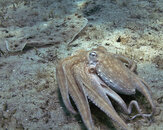Anne Dupont ( author many at BHB know) is requesting video of this predatory behavior of the worm toward the octopus...Apparently, this is a development that is shocking to the scientists that specialize in the octopus -- they want to see a lot more.... I am thinking that there is a huge population of octopus here, and a huge p[opulation of the fire worms...maybe the fireworms ran out of their more standard prey, and rather than go into the classic exponential die of as their prey dissappears, they adapted a new behavior and began preying on the octopus....
It does not appear that the octopus is well equipped to protect it self from the worms, using their traditional strategies--in a beer bottle home, they are catastrophically trapped when a worm decides to enter....
My ideas are just conjecture....the scientists want to actually figure this out for real...thus, the call for some videos.....and potentially more requeasts to come...





